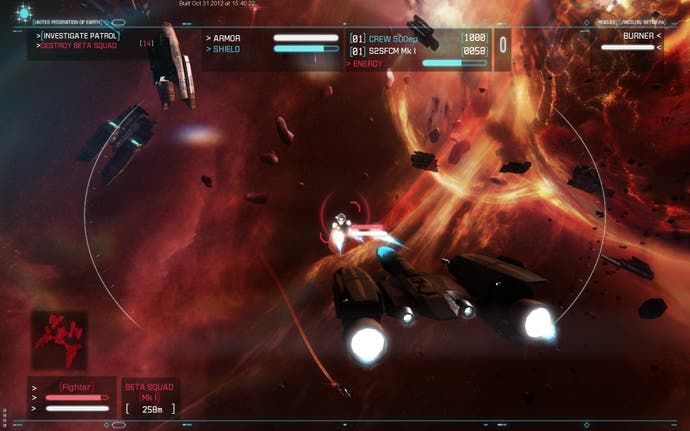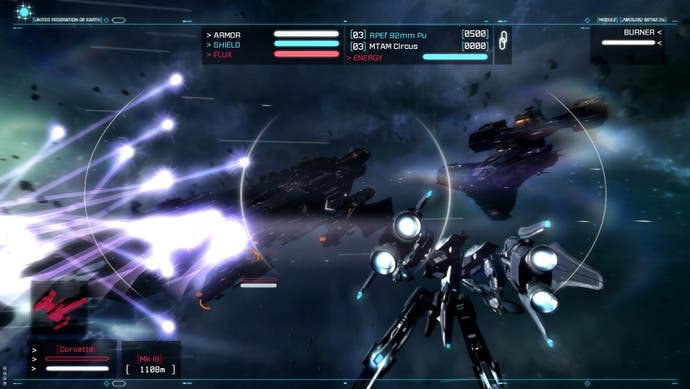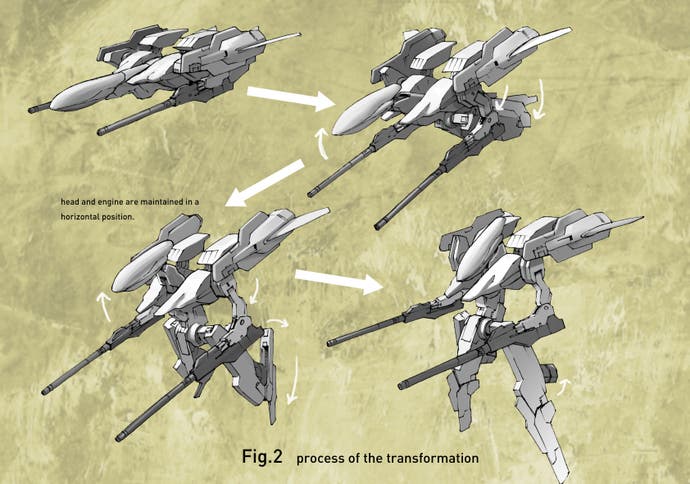Returning to the stars: Strike Suit Zero and the new space phenomenon
Born Ready's at the forefront of a new wave of space combat games - and Kickstarter's to thank for the revivial.
Development studios are invariably spartan places, and they're pretty much invariably in Guildford, too. So it is with Born Ready Games, one of the many indie outfits that calls this corner of Surrey home; they're friendly neighbours with Hello Games, both of whom are slightly less friendly neighbours with the local taxi firm that keeps nicking their shared parking spaces. Such are the problems facing indie developers today.
It's also a happy place to be, especially right now. The afternoon I visit, the studio's in the blissful twilight between passing its Kickstarter goal and actually getting to the pub to celebrate the milestone, the 20-strong team just a Friday afternoon away from a well-deserved evening on Guildford's tiles. The studio took a gamble by turning to crowd-funding to help finish off its project, and it's a gamble that's paid off.
Born Ready has always worked on the frontier, even in its previous lives. Formed from the remnants of what was once Kuju Surrey, when the developer was known as DoubleSix it was there as digital distribution began to take hold on consoles, releasing Burn Zombie Burn and All Zombies Must Die on PSN before the pair stretched their legs out to Xbox 360 and PC. Its first game in its new guise finds itself at the crest of another wave.
Strike Suit Zero, a space combat game that dips into the same, long-abandoned well as the likes of Tie Fighter and Wing Commander, is a very different experience to the ones the team has produced before. It's an indie game, yes, but it's one with ambition that soars as high as its mech-ships, and with production values that belie the size of the team who've created it.

It helps that Born Ready's brought in some exceptional talent from further afield. Doing the music's Paul Ruskay, who previously contributed the elegant score for fellow space shooter Homeworld, while Junji Okubo, an artist who's previously created the machinery of such as Infinite Space and Appleseed: Ex Machina, is on design duties.
It's a space combat game, but it's one with pedigree and a handful of modern sensibilities. Strike Suit Zero evokes the classics well enough, and updates the fizz and sparkle of space combat with some dashing visuals - ships dart in between frigates and cruisers that are tossing out electric confetti. The huge craft can be chipped away at, exposing weak points until they finally crumble, their carcasses floating across the battle-space.
The visuals aren't the only thing that have benefitted from a more contemporary touch - the moment to moment fighting's been stripped back a little, pushing aside the need for micromanaging systems of older space combat games for more instant thrills. Your ship - and there are a handful of flavours alongside the eponymous mech/fighter hybrid - has a certain sense of urgency, and there's a strong emphasis on action.
Some of that complexity's been shifted away from the battle-space - before heading into combat, load-outs can be selected while there are various upgrade paths that can be pursued, many unlocked by going back and fulfilling certain mission objectives. It's a well formed, well thought out update of the space combat genre, and it's one that's already impressed in its public showings at the Eurogamer Expo earlier this year. So why did Born Ready feel the need to turn to Kickstarter when it was mere months away from release?
You need to bare your soul to have someone think they'll give you $20. You have to bare your soul, and that's what we did.
"We got to a stage where we needed to bring in some more investment," James Brooksby, Born Ready's chief, tells us. "Early on we wanted to do it, but it wasn't clear exactly why we wanted to do it. If we'd have gone out there too early it would have been quite weak.
"When we went out there this time the message was genuine. We've got the game to this stage and instead of releasing in October we want to release in January because we know we can make a better game. But it's not that simple - you can't fund 20 people for three months with hot air alone. So we're going to need some help. Our investor can help, but he can't do it all - so Kickstarter was important."
Strike Suit Zero's goals may have been slightly more modest than its space combat compatriots - compared to the $500,000 requested for by Chris Roberts for Star Citizen and the $1.2 million being sought by Frontier for Elite, Born Ready was only looking for a relatively meagre $100,000 - but it's been a success, the first target being met after two weeks with the stretch goals looking well within reach.
The benefits for Born Ready are much more than just financial, though. "The other thing is that Kickstarter - it's a fantastic way of getting the word out," says Brooksby. "As far as we're concerned, we've got very small marketing budgets, and it couldn't get more word out better - there's nothing that could achieve this without some huge spend."
So what makes for a successful Kickstarter? "It's the story. We've constantly had to pitch to investors, pitch to publishers. It is like that Dragon's Den thing, and everyone of those people is a dragon. They're all sat there, and are saying, right, impress me or I'm out."
"The thing about Kickstarter is that you're backing something because it has a good story and it has a good message. You're investing in a story and the people behind that story - if you go out there and say you want to do Kickstarter just because you fancy doing it, well most people say that they don't fancy backing you.
"You are really warts and all exposing yourself in a massive way. And you have to. If you don't, then people will say there's something not right there - they're not exposing what they really are. And you need to bare your soul to have someone think they'll give you $20. You have to bare your soul, and that's what we did."

Strike Suit Zero's not alone in wanting to revive the space combat genre, and by some happy coincidence it's at the forefront of a whole wave of games that are returning to the stars. It even, inadvertently, went toe-to-toe with one of them, hitting Kickstarter the same day as Chris Robert's Star Citizen.
"Oh my god," Brooksby exclaims as he recalls the incident. "There's a parallel universe where that didn't happen - but I'll never know what happened there. We saw it go up and thought all our backers were going to go there. But we don't know - did it bring people who are interested in space combat to our game? Maybe they saw that Chris Roberts' game was for 2015, and we're early next year."
It doesn't seem to matter too much, anyway - the appetite for space combat game seems to be large enough to accommodate Star Citizen, Strike Suit Zero and, most recently, an all-new Elite. The resurgence of the form may not be solely down to new tastes, though - it's quite likely, says Brooksby, that niche interests are now that much easier to cater for.
"We're accountable to gamers, and we're gamers," he says of Strike Suit Zero's genesis. "So we sat there and thought what would we like to see? Space combat's a niche, but now if you find a niche, and if you reach that niche, it's a global thing. And if you can reach it, it can work, and it can work really well.
"A lot of people are saying why space combat, and why do this now - the feeling that I got talking to all the other people was that we thought how lucky the gamers are to be gamers now. Because there's all these quite obscure and niche games, but they exist and are getting made to a good quality. Ten years ago it would have been absolutely impossible."
"They're going to have to turn their oil tankers into speedboats pretty quick. They're trying to shift."
There's a feeling that Kickstarter's what's made all this possible, and, for gamers of a certain ilk, it's the place where dreams can seemingly come true - where sequels that have been lusted after for years can be conjured into life. But it's a bubble, and one that's inflating fast - Kickstarter's in danger, some feel, of being a magical nostalgia machine that at some point in the near future's going to collapse, leaving behind it a pile of broken dreams.
"I don't think it'll burst," Brooksby believes. "There'll be a period whereby it'll wane a little bit, and that'll be where something goes wrong. And everyone's waiting for something to go wrong."

Nothing has gone wrong - yet - but there have already been projects that ran into trouble, and when you combine the relative youth of Kickstarter with the standard prolonged development period for most videogames, it's only inevitable that further problems will arise.
"People are investing, and investors in the real world invariably get burnt," Brooksby says. "They get burnt nine times out of ten, and that one time pays back for all the problems. I don't think it'll happen nine times out of ten, but something will go wrong.
"I don't know what it is - it might be a scam where someone runs off to the Bahamas with all that money, or it'll be a project cancellation where someone didn't get their maths right, or the project's just not good. Everyone's backed it all this way, and it just didn't work. The last one's survivable - the biggest worry is a high-profile project that never appears. The thing about Kickstarter is that you are donating on faith, and on good faith. And it could conceivably happen."
Brooksby's confident that the inexorable storm can be weathered by Kickstarter, though. The bigger problem, perhaps, will be faced by the publishers who are seeing their place in the chain being eroded as developers find a direct line to gamers.
"They're going to have to turn their oil tankers into speedboats pretty quick. They're trying to shift. The lucky ones, they'll have core franchises - you can get into a taxi in London and say you're in the games industry, and they'll say they love FIFA and they're getting Call of Duty this winter. That's fine. Those guys will do just fine, because they can transition slowly and they can take their time.
"It's the mid-tiers that are going to struggle, because they haven't got a killer franchise. I think they're wisely scaling back fast, and thinking about what they're going to do. They're looking at the developers and asking how they can work hand in hand. There are very different conversations going on than there used to be, where it would just be like 'next!'. Now they're trying to work together and figure something out - which is good, and it feels right. It feels more like it used to feel many years ago."

